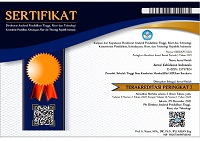- Focus and Scope
- Section Policies
- Open Access Policy
- Peer Review Process
- Publication Frequency
- Publication Ethics
- Screening For Plagiarism
- Reference Management
- Retraction
Focus and Scope
Jurnal Kebidanan Indonesia provides a medium for those who want to publish their scientific articles from either research results or innovations in the fields of midwifery and health. The scope of Jurnal includes Birth, Pregnancy, Newborn, Adolescence, Family Planning, Climacterium, Midwifery Community, Education in midwifery, complementary therapy in midwifery and other related thopics
Section Policies
Artikel
Open Access Policy
Jurnal Kebidanan Indonesia provides immediate open access to its content on the principle that making research freely available to the public supports a greater global exchange of knowledge. This journal is open access journal which means that all content is freely available without charge to users or / institution. Users are allowed to read, download, copy, distribute, print, search, or link to full text articles in this journal without asking prior permission from the publisher or author. This is in accordance with Budapest Open Access Initiative.
Peer Review Process
Every article that goes to the editorial staff will be selected through Initial Review processes by Editorial Board. Then, the manuscript will be sent to at least two anonymous reviewers (Blind Peer Review). After that, the articles will be returned to the authors to revise. These processes take 2 month for a maximum time. In the each manuscript, Mitra Bebestari/ peer reviewer will be rated from the substantial and technical aspects. Mitra Bebestari/ peer reviewer that collaboration with Jurnal Kebidanan Indonesia : Journal of Indonesia Midwifery is the experts in the midewifery research and various issues. They were experienced in the prestigious journal management and publication that was spread around the national and abroad.
Publication Frequency
Jurnal Kebidanan Indonesia published twice a year (January and July)
Publication Ethics
This statement is to clarify the ethical behavior and legal standards of all parties involved in the publishing process of Jurnal Kebidanan Indonesia, including authors, editorial board members, reviewers, and publishers. This journal expects all parties to understand this ethical policy before submitting or accepting to review a manuscript. It frowns at and will not tolerate any form of copyright abuse or publishing malpractice. This is in accordance with our commitment and determination to prevent ethical misconduct which we recognize as a growing problem in academic and publishing circles. This statement is based on COPE's Core Practices (https://publicationethics.org/core-practices).
Duties of Authors
Authors of Jurnal Kebidanan Indonesia should submit an original work which has not been published and is equally not under the consideration of other journals or publishers. Original paper means the article is not only repeating the previous work. Submitting the same manuscript to more than one journal constitutes unethical conduct. It is unacceptable.
The report of an original research paper should be presented in detail and accurately. It uses citation or quotation properly when replicating the work, ideas, and/or words of others to minimize the possibilities of plagiarism and other research fraud including data fabrication and falsification. It is mostly discovered in the practice of modifying results, the sources, and improper interpretation of the observation to make a convincing elaboration.
The corresponding author should inform the editor once they find significant errors or inaccuracy in their publication to make a retraction or correction. When necessary, the author must disclose the data to the editor during the process of review for the accuracy of the report.
Proper acknowledgment of people involved must always be made. If they have made a significant or substantial contribution to the conception, design, execution, or interpretation of the reported research, they should be listed as co-authors. The corresponding author has a responsibility to ensure that those co-authors have agreed to submit their work for publication. The corresponding author must also disclose any sources of funding and declare that it would not influence the result of the report.
Political and behavioral studies sometimes involve human subjects. If the manuscript contains this method, it is unethical for the author to exploit and/or disclose any confidential data or information on the human subject.
Duties of Editors
Editors are responsible for an initial review of a manuscript to evaluate the originality and do the first screening of any practices of research fraud. During the review, an editor must only consider the content of the article regardless of gender, race, sexual orientation, religious belief, ethnic origin, citizenship, or political philosophy of the author. Any information related to the author and unpublished material treated as a confidential document must not be shared to other people outside the publishing process of the article or used for the editor's own research without the written consent of the author.
The editor is responsible to fairly and wisely select the peer-reviewer who has sufficient expertise and avoid those with conflict of interest. On the other hand, the editor must disclose or refrain from assuming this responsibility if he/she becomes a subject of this issue.
The editorial board has the responsibility to make decisions about the publication of an article. However, if there is evidence of research fraud such as plagiarism, copyright infringement, or libel, editors have the right to contact the author to justify and confirm the data in their article. This right and responsibility are given to the editorial board in order to have a guarantee of an ethical and high-quality article.
Duties of Reviewers
Reviewers or advisory board is a group of people who are assisting the editorial board in making decisions and improving the quality of articles at the same time. Therefore, reviewers play an important role in any scientific journal publication.
A reviewer must provide high-quality feedback on the manuscript assigned to them. It must be constructive, clearly stated, with supporting arguments or references. The review process must be conducted objectively such that the reviewer's personal criticisms to the author should not mark the work.
Any selected reviewer who feels unqualified or cannot provide feedback in a timely manner should notify the editors and excuse himself/herself from the review process. Therefore, if she/he wants to pass the manuscript to their colleague to review, they must have the editor's permission beforehand.
Reviewers should declare any competing interests to the editor before accepting to review or during the review process. They should decline from reviewing if it generates a competitive, collaborative or other relationship challenges with any of the authors, companies, or institutions connected to the papers.
All information during the peer-review process must be kept confidential and must not be taken advantage of. Afterward, the reviewer has a responsibility to give a recommendation and notify the editor if they found any proofs of fraud during the peer-review process.
Duties of Journal and Publisher
The journal and publisher should be committed, ensuring that any sources of funding have no influence on the editorial decision. They must construct a policy which accommodates the merits of the development of science and the protection of the intellectual rights of the author. The journal and editor should allow corrections, retractions, and revision from the author through a flexible mechanism after getting the endorsement of the editor.
Screening For Plagiarism
The manuscript that submitted into Jurnal Kebidanan Indonesia will be screened for plagiarism using Turnitin. If an article is indicated as a plagiary, it will be rejected and will not be reviewed.
Reference Management
All the served data or quotes in the article taken from the other author articles should attach the reference sources. The references should use a reference application management such as Mendeley, End Note, or Zotero. The writing format that used in Jurnal Kebidanan Indonesia : Journal of Indonesia Midwifery follows the format applied by APA 6thEdition (American Psychological Association).
Retraction
The papers published in Jurnal Kebidanan Indonesia will be consider to retract in the publication if : They have clear evidence that the findings are unreliable, either as a result of misconduct (e.g. data fabri-cation) or honest error (e.g. miscalculation or experimental error) the findings have previously been published elsewhere without proper crossreferencing, permission orjustification (i.e. cases of redundant publication) it constitutes plagiarism it reports unethical research The mechanism of retraction follow the Retraction Guidelines of Committee on Publication Ethics (COPE) which can be accessed at https://publicationethics.org/files/retraction%20guidelines.pdf.








